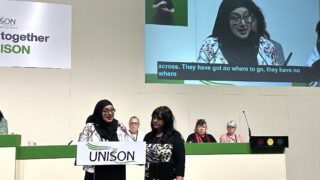It’s a long way from the North of England to South America, from an office job in Newcastle City Council, to talking to sugar cane cutters and their families in a Colombian village.
But 28-year-old Conor McArdle has made that journey. And he says it’s changed his life.
Conor has been the international officer with his UNISON branch for a year. Last year the fledgling officer applied for a UNISON grant designed to encourage activists to take part in international work, and which enabled him to join a delegation to Colombia to visit one of the Northern region’s most impressive projects.
In conjunction with War on Want and the human rights organization Nomadesc, over the past four years the union has sought to educate, empower and train the women of the sugar cane communities in the south west region of Colombia.
Explains Northern regional convener Clare Williams: “In 2008 the sugar cane cutters, the corteros, had a very significant strike, over job losses and changes to their terms and conditions because of the mechanisation of the sugar cane industry. Those workers had very few employment rights anyway, so they were also campaigning for proper access to health care and other basic rights.
Birth of a women’s movement
“The corteros are predominantly men, but their families and communities were being impacted, because everyone is dependent on them for sustenance. There’s an analogy with the miners’ strike in the UK, when women set up miners’ support groups. Out of that strike in Colombia the wives and relatives of the corteros set up their own support network, and a whole women’s movement was born. What they have achieved is amazing.”
Northern region’s capacity-building project, funded by the UNISON International Development Fund, played its part – helping around 100 women across eight different communities to develop organising and campaigning skills, as well as practical, craft-making skills that would enable them to make their own contribution to their families’ financial futures.

The project has led to the formation of the Women’s Sugar Cane Committee, a recognized body that campaigns for the economic wellbeing of their communities.
Conor was able to see the fruits of that work first hand, from meeting the members of the committee, visiting a cortero village and another community living hand-to-mouth on the edge of the jungle, and attending the 4th annual women’s forum, sponsored by the Northern region, which brings together trade unions, social movement organisations and indigenous communities.
“I couldn’t believe how people at the forum were speaking out against human rights abuses, so close to government buildings,” he recalls. “A terrible part of the trip for me was that pretty much everyone I met knew someone who had been killed or disappeared.
“They fight the same battles as we do, over privatisation, jobs and conditions. But when I think that they get death threats for the sort of campaigning that we do on a daily basis, yet they’re still active, and are so warm and friendly, it’s overwhelming.”
He was inspired not just by their spirit, but the way they fuse the political with the social and cultural aspects of campaigning. “There’s always music involved, and arts and crafts, and that makes their campaigning so much more vibrant.”
When Conor visited the cortero village of Pradera, he saw women at work at their sewing machines, producing the goods that will help put food on the table.
Engaging with members
Clare, who was on the delegation along with Conor and Katrina Murray from the Lanarkshire Health branch, says: “They make some incredible goods – bags, hats, scarves. We commissioned some bags from them, which we then had shipped over to the UK and sold on their behalf.”
She laughs. “You can now see quite a lot of people in the northern part of the UK carrying some very dashing bags.”
And selling the bags was a really good way of engaging with members on international issues, she adds. “When you explain who’s made the bag, why it’s important, the challenges faced by the communities in Colombia, people really connect on a human level. They realise that our work is not about charitable gestures, but mutual respect and international solidarity.”
Clare ensures that branches are informed about the work of the project, and that visiting Colombians speak to members about their experiences. And so the project adds to the political education of UNISON’s own members, she says, with much to be learned from the battle against neo-liberalism and privatization in another country.
“We have branches that are really involved now. We’ve been able to develop that human dialogue. It’s one of the region’s achievements that I’m most proud of.”
Conor would recommend international work to fellow members, especially younger ones. “You learn so much from meeting other people and seeing how they organise. An experience like mine completely changes your perspective and to a certain extent changes your life. It gives you an appreciation of what international solidarity means and why it’s so important.”
* The UNISON International Development Fund is funded by monies received from the partner organizations.
This article first appeared in the Spring 2014 issue of U magazine




